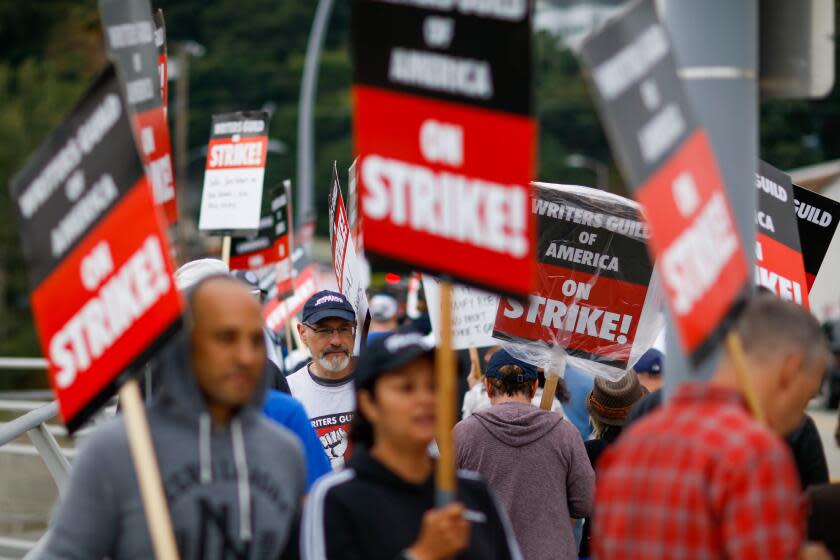WGA says it's open to dealing with individual studios without AMPTP amid 'paralysis'

The Writers Guild of America said Friday that it would be open to negotiating separate deals with major studios outside the "confines" of the media companies' usual alliance, as the writers have been striking for 130 days with no end in sight.
The studios, which include Netflix, Walt Disney Co. and Warner Bros. Discovery, are represented by the Alliance of Motion Picture and Television Producers. Negotiations between AMPTP and WGA restarted last month, but there has been little movement since then.
"There is no requirement that the companies negotiate through the AMPTP," the WGA's negotiating committee said in a note to members on Friday. "So, if the economic destabilization of their own companies isn't enough to cause a studio or two or three to either assert their own self-interest inside of AMPTP, or to break away from the broken AMPTP model, perhaps Wall Street will finally make them do it."
AMPTP said in a statement it has already made offers that address the major priorities of the WGA and that its members are eager for a resolution to the dispute.
“The AMPTP member companies are aligned and are negotiating together to reach a resolution," the alliance said in a statement. "Any suggestion to the contrary is false."
The writers' strike began in early May and film and TV actors joined them on the picket lines in mid-July. The dual Hollywood strikes have delayed or suspended many productions, resulting in significant economic damage in California that has disrupted the lives of crew members and entertainment-related businesses including talent agencies and prop houses.
Read more: Writers' strike: What's at stake and how it could disrupt Hollywood
Studios have also experienced financial pain from the strikes. Warner Bros. Discovery on Tuesday said its profits could come in as much as $500 million lower this year than its earlier expectations mainly because of the strikes. Warner Bros. Television also recently suspended overall deals of multiple high-profile producers.
Some showrunners, including Greg Berlanti, Ryan Murphy and Paul Feig, set up or contributed to funds designed to help people who are out of work.
The WGA's message reflects the frustration building among the entertainment industry's workforce. Not only writers and actors, but also craftspeople, drivers and grips, have been unable to ply their trades for months.
The WGA blamed the stalemate on the studios and the diverging priorities and business models among the AMPTP members, which include traditional film and TV companies, pure-play streaming services and studio operations owned by tech giants.
"The current standstill is not a sign of the companies’ power, but of AMPTP paralysis," the WGA negotiating committee wrote.
Read more: Why Hollywood's labor nightmare won't end soon: Frustration, fear and mistrust
On Aug. 11, the AMPTP put forth a proposal that, according to the studio group, offered to increase WGA wages 5% in Year One of the proposed contract, followed by gains of 4% and 3.5% in subsequent years. The WGA had sought a 6% increase to minimums and residual bases in the first year, followed by 5% increases in the second and third years.
A major sticking point in negotiations has been the WGA’s request to require a minimum amount of staffing in writers’ rooms, which have shrunk in size during the streaming era.
To address the issue, the AMPTP said it would allow the showrunners on high-budget streaming and pay-TV series to assign at least two midlevel writers to the production for at least 20 weeks of employment. It further proposed guaranteeing writers a minimum of 10 weeks of employment in development rooms.
The AMPTP also offered to give the WGA quarterly confidential reports that show total number of minutes a high-budget program is viewed and the program's total running time. But WGA said there were shortfalls in the alliance's pitch. While the AMPTP would allow six guild staff members to study that data, "no writer can be told by the WGA about how well their project is doing, much less receive a residual based on that data," the WGA's negotiating committee wrote in an Aug. 24 note to the union's members.
"The counteroffer is neither nothing, nor nearly enough," the WGA negotiating committee said in its memo. The committee said it responded to the AMPTP’s counterproposal on Aug. 15.
The union also noted that in a meeting on Aug. 22 with AMPTP, the committee said it was told the alliance’s Aug. 11 proposal “had to be the basis for the only deal they were willing to make.”
AMPTP on Friday night said it was waiting on the WGA. The alliance said in its version of the timeline of proposals that on Aug. 18, the "WGA indicated it would respond the following week. AMPTP has not heard from the Guild since that time."
Read more: Not just writers and actors: Crew workers struggle through Hollywood's summer of strikes
The WGA's Friday update blasted AMPTP members, accusing them of trying to sow dissent within the ranks of the union, which has enjoyed a high level of public solidarity. The AMPTP on Aug. 22 released a summary of its Aug. 11 proposal, a move that WGA members saw as an attempt to make an end-run around the negotiators.
The guild said in its note on Friday, "the companies inside the AMPTP who want a fair deal with writers must take control of the AMPTP process itself, or decide to make a deal separately. At that point, a resolution to the strike will be in reach."
"We share frustration with how long the companies are prolonging the strike, and remain committed to negotiating a fair resolution as fast as possible," the WGA negotiating committee said in its note.
Times staff writer Meg James contributed to this report.
This story originally appeared in Los Angeles Times.


